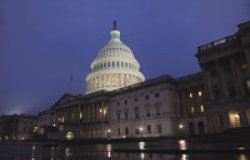Wilson Center Holds Seminars on the Hill
The new initiative Wilson Center on the Hill is bringing Center programming on the latest topics to Capitol Hill to help inform policymakers and their staff on their own turf. The nonpartisan forum tackles specific, timely issues related to foreign policy, economics, and the environment.
This year, the Woodrow Wilson Center launched a new program that is bringing the Center's work to new audiences. Members of Congress, congressional aides, and policy analysts now can attend Wilson Center seminars on their turf, in the office buildings of the U.S. Capitol complex.
Launched in June, Wilson Center on the Hill is a nonpartisan forum focused on current issues related to international trade and security, sustainable development, and globalization. Funded by a grant from the William and Flora Hewlett Foundation, Wilson Center on the Hill is to sponsor about 20 seminars a year on Capitol Hill that feature leading independent analysts and experts from the Wilson Center's 23 regional and thematic programs. Recent Wilson Center on the Hill seminars have focused on the Russia-Georgia conflict, foreign direct investment, the global food crisis, and trade and security policy.
Wilson Center on the Hill also will sponsor congressional study trips abroad, allowing Members of Congress and senior congressional staff to gain intimate knowledge of pressing policy issues. The first research trip, now scheduled for December, will take a small delegation to El Salvador and Guatemala to gain a firsthand understanding of trade and security challenges in the region. During this trip, which is co-sponsored by the Center's Latin American Program, Members of Congress will meet with government officials, visit factories, and interact with professionals in the field.
"By bringing the expertise of the Wilson Center to people on the Hill, we're engaging with Congress in a more comprehensive way," said Wilson Center on the Hill's Consulting Director David Klaus. "We choose topics that focus on issues relevant to what Congress is doing today."
One example is the September 12 seminar on the Russia-Georgia conflict. Congress was in recess when the conflict broke. "Within the first week after Congress came back, the Wilson Center's Kennan Institute did the first program on the Hill on this issue," Klaus said. "We gave Hill people the first chance to learn about it from our experts."
Climate and Energy
Wilson Center on the Hill hosted a well-attended meeting on climate and energy, co-hosted by the Environmental Change and Security Program. "The issue of our time is the combination of energy security and climate change," said former Congressman Sherwood Boehlert, a panelist at this September 23 forum, titled, "Thinking Outside the Grid: An Aggressive Approach to Climate and Energy."
Boehlert noted the energy-climate nexus has become a national security concern, especially given higher gas and food prices. He and panelist Lester Brown, founder of the Earth Policy Institute, lauded Texas oil magnate-turned-wind farm entrepreneur T. Boone Pickens. "He was tired of oil depletion," said Brown, "and he invested in an energy system [wind] that can last as long as the earth itself."
Brown explained that the faster-than expected melting of Arctic ice indicates the severity of the climate crisis. "Without these glaciers, many of these rivers would be seasonal rivers, running during the rainy season, but not during the dry season," said Brown. Year-round irrigation would decline, ending the double cropping vital for sustaining Asia's massive population. With China and India major producers of wheat and rice, such environmental threats would propel world food prices to skyrocket along with food insecurity. "We don't quite grasp this yet," said Brown. "If it is China's problem, it's also our problem…We would be competing with 1.3 billion Chinese, with rapidly rising incomes, for our grain supply."
While cutting carbon emissions can help prevent glaciers from melting, Brown said investing in renewable energy is critical, particularly increasing support for existing alternative technologies, including wind, solar, and geothermal projects. The technology exists, said Brown. The challenge "is to get the market to tell the environmental truth, and that means incorporating the cost of climate change into the cost of fossil fuels."
Energy companies such as BP and Shell are gradually investing more money in cleaner technologies, noted Melanie Kenderdine, associate director of MIT's Energy Initiative. She added that venture capitalists have also put funds into renewable alternatives. Still, Kenderdine emphasized "the enemies of urgency are many," so governments must exercise leadership on energy innovation. Ninety percent of the U.S. Department of Energy's budget "is not for energy, has nothing to do with energy," decried Kenderdine. "And if we don't fix that, we're not going to be able to rapidly develop the technologies and do it in the right way with the right incentives, right sequencing of investments that we need in order to deal with the climate issue."
The challenge is providing energy everyday: "clean, sustainable, affordable energy for 6 or 7 billion people. The future of the planet is at stake," she said.
Upcoming Wilson Center on the Hill programming will include a presentation by renowned primatologist Jane Goodall, and seminars on the food crisis in China, on the potential of biofuels, and the impact of the current financial crisis on developing countries. Wilson Center on the Hill also plans to conduct a series that provides an overview of key policy issues by individual region. Wilson Center on the Hill seminars focus on issues currently on the congressional agenda, and the audiences continue to grow as word spreads about these timely, informative seminars.
